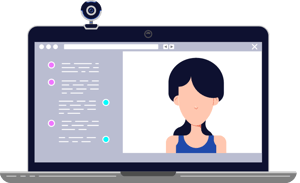Congratulations, you’ve been selected for an interview! As most professionals know, simply showing up is not the next step. It’s time to review your resume and qualifications, research the company, and align your transferable attributes and experiences – not to mention polish up on your interview skills. Proper preparation can help calm your nerves, side step any avoidable mishaps and enable you to put your best foot forward.
Interviews have also changed quite a bit in the past several years. Social networking tools provide candidates with a wealth of information on interviewers and companies (and vice versa); video interviews have become increasingly popular; and cultural fit is being taken into higher account when evaluating candidates. It’s likely you will encounter three main types of interviews during a job search: phone, video and/or in-person. Below are a few ways to make sure you’re ready to ace any type of interview.

Phone interviews
A phone interview is often the first step in securing an in-person interview. This will likely be with either a recruiter or a hiring manager, depending on the company. While phone interviews are commonly driven by a series of questions, approach them like you would if you were meeting the individual for coffee. Ask follow-up questions and actively engage in the conversation.
Exuding confidence is important in all interview situations, but even more so on the phone, where body language and facial expressions are not visible. Remain professional, but bring your full personality to the conversation. Phone interviews are often short; this is your time to shine and demonstrate why you are the right candidate for the job. Take a few deep breaths before the call and remind yourself to be direct and talk slowly. It’s likely the interviewer will be taking notes and trying to accurately capture your responses. At the same time, this means you may not receive much immediate feedback and pauses may occur.
If you’re answering an initial call from a recruiter – whether from the hiring company or a recruiting firm – know that a first impression is a valuable part of the interview process. If you’re not expecting the call and are unable to talk, ask if you can connect later that day. If you’re not interested in the position, be gracious and ask to be kept in mind for future roles that are more in line with what you are looking for.
Video interviews
 Video interviews have increased in popularity throughout the past few years. It’s likely you will encounter this type of interview at some point, if you haven’t already. They enable candidates to meet with a variety of decision makers and teammates, regardless of travel schedules or geographic locations.
Video interviews have increased in popularity throughout the past few years. It’s likely you will encounter this type of interview at some point, if you haven’t already. They enable candidates to meet with a variety of decision makers and teammates, regardless of travel schedules or geographic locations.
Unlike phone or in-person interviews, video interviews require additional technical preparation. This may mean downloading and testing a specific video software and ensuring your computer microphone and speakers work correctly. Think about what will be in the background of your call and ensure it is neutral and professional. Additionally, consider the lighting and time of day to make sure you are well lit, rather than in a shadow. Call a friend, or a recruiter if you are working through a staffing firm, to test out your audio and video clarity prior to the call.
While video interviews may seem informal, dress as you would if you were meeting the interviewer in person. You can also be a bit more animated in video interviews (without going over the top), as people tend to look more still than they think on video.
In-person interviews
When you are brought in for an in-person interview, a few different factors are at play. It’s possible you will meet with more than one person. Additionally, it’s likely you have already had a video or phone interview, meaning your qualifications are a match and they want to learn more about you.
If you are working with a recruiting firm, ask the recruiter about the individuals you will be meeting prior to your interview. Check them out on LinkedIn and do your background research. Knowing your audience is an advantage and can help you connect on a deeper level. For instance, you may have gone to the same college or perhaps you are involved in similar charity work or other activities.

While it’s important to be well-groomed, show your personality if possible. Check in with your recruiter to see what expected interview attire is for the company. If you never wear a tie, and the company has a more casual dress code, you may be more comfortable in a button down and jacket. If you prefer pants, don’t feel like you must wear a dress or skirt to be in “interview attire.” Look professional, but don’t sacrifice your comfort.
All interview situations
Of course, a few tips are applicable to all interviews, no matter the format:
- Be honest and candid about what you are looking for as far as compensation, career growth and other factors. If a position is not right for you, recruiters and hiring managers may keep you in mind when the perfect role does become available.
- Be on time. If you are going to be late for an interview, no matter the format, let your recruiter know as early as possible.
- Follow up. In today’s fast-paced recruiting environment, sending a thank you email the same day or morning following (depending on the interview’s time) is standard. This enables you to reiterate your interest, thank the interviewers for their consideration and share any relevant follow-up details.
- Keep the conversation going. If you didn’t get the job or a final interview, don’t take it personally. Show appreciation for being considered. Let the recruiter or hiring manager know you’d be interested in future positions that might be a fit.
- Maintain professionalism. From the first time you speak with a recruiter onward, you are building relationships and showing who you are as a professional. Even if you are not interested in the role or it’s not the right time for you to make a move, refrain from burning bridges.
Taking time to prepare before an interview can mean the difference between a stellar connection and stumbling for answers. You’ve earned this opportunity, now is the time to let your personality, skills and aptitude shine.


